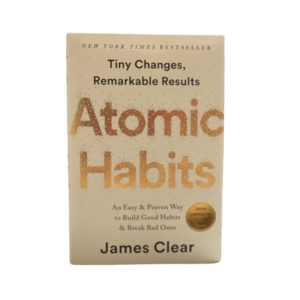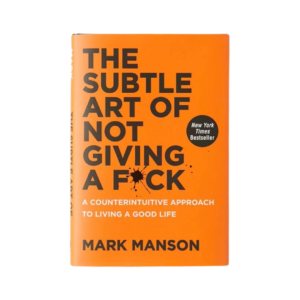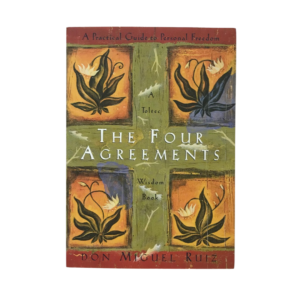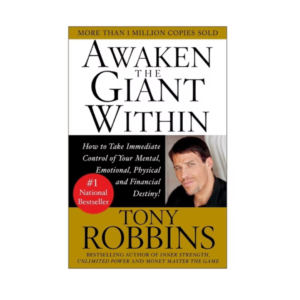“Each page we turn is a step forward in the journey of self-discovery and personal transformation.”
In a world that constantly evolves, the pursuit of self-improvement has become more vital than ever. Personal growth is not just about achieving material success or climbing the corporate ladder; it’s about becoming the best version of yourself—physically, mentally, and emotionally. Reading is one of the most powerful tools to aid in this journey. It provides insights, strategies, and inspiration from individuals who have dedicated their lives to mastering their respective fields.
Whether you’re looking to build better habits, develop mental resilience, improve relationships, or simply gain a deeper understanding of yourself, books can provide invaluable guidance. With countless options available, it can be overwhelming to choose the right one. That’s where this curated list of the top 10 books for self-improvement and personal growth comes in.
Each book on this list offers unique perspectives and actionable advice to help you achieve lasting change. From the science of habits to the philosophy of mindfulness, these books provide a roadmap for anyone seeking to improve their life.
Let’s dive into the top 10 books that can spark your personal growth journey.
1. “Atomic Habits” by James Clear
James Clear’s Atomic Habits is one of the most practical guides to building good habits and breaking bad ones. In this book, Clear introduces the concept of atomic habits, or small, incremental changes that lead to significant improvement over time. His approach is rooted in behavioral science and psychology, making it highly applicable to everyday life.
Clear emphasizes the power of making small adjustments rather than striving for drastic, unsustainable change. He breaks down how habits work in a four-stage loop: cue, craving, response, and reward. By understanding and manipulating this loop, readers can build positive habits while removing destructive ones.
Key Concepts:
- The Habit Loop: Every habit is a feedback loop involving a cue, craving, response, and reward. Understanding this helps break bad habits and reinforce good ones.
- Habit Stacking: A technique where you link a new habit with an existing one, making it easier to incorporate into your routine.
- Environment Design: Structuring your environment to make the right habits easier and the wrong habits harder.
Atomic Habits is ideal for those looking to make lasting, manageable changes in their lives. Whether you want to improve productivity, fitness, or personal relationships, Clear’s techniques are practical and easily implementable. He provides actionable strategies such as habit tracking, designing better systems, and setting achievable goals. Over time, these tiny habit changes compound, leading to significant personal growth.
2. “The Power of Now” by Eckhart Tolle
In The Power of Now, Eckhart Tolle explores the profound impact of living fully in the present moment. This book takes a spiritual approach to personal growth, encouraging readers to detach from their ego-driven mind and the constant chatter that pulls them out of the present. Tolle explains that most people live in either the past (regrets) or the future (worries) rather than embracing the now, which is the only real moment we have.
Through mindfulness and present awareness, The Power of Now helps readers let go of emotional pain and mental suffering caused by over-identification with their thoughts. Tolle’s work is more than just a guide to mindfulness—it’s a transformative book that promotes spiritual awakening.
Key Concepts:
- Mindfulness: The practice of staying grounded in the present and fully experiencing each moment without judgment.
- The Pain-Body: Tolle describes this as accumulated emotional pain that manifests in recurring negative thoughts and behaviors.
- Ego and Detachment: The ego constantly seeks validation through external achievements, but true peace comes from detaching from this need and living in the now.
For individuals struggling with anxiety, stress, or overthinking, The Power of Now offers a way to break free from those mental traps. It encourages readers to live more consciously, embrace their inner stillness, and reduce unnecessary suffering by focusing on the present. This book is a spiritual guide to inner peace and emotional resilience, which are essential components of personal growth.
3. “The 7 Habits of Highly Effective People” by Stephen Covey
Stephen Covey’s The 7 Habits of Highly Effective People has become a timeless manual for personal and professional effectiveness. Covey argues that effectiveness is a result of aligning with fundamental principles, such as fairness, integrity, and human dignity. The book is divided into three main categories: independence, interdependence, and continuous improvement, each built on specific habits that guide the reader toward a more productive and meaningful life.
Covey explains that true effectiveness comes from changing your internal paradigms and developing a character based on timeless values, rather than quick fixes or surface-level behaviors.
Key Concepts:
- Be Proactive: Taking responsibility for your reactions and actions instead of being driven by external circumstances.
- Begin with the End in Mind: Developing a clear vision of your life goals and aligning your daily actions with that vision.
- Seek First to Understand, Then to Be Understood: Fostering empathy and clear communication in personal and professional relationships.
This book provides a framework for personal transformation that emphasizes self-mastery, leadership, and effective collaboration. Covey’s habits encourage readers to take proactive control of their lives, prioritize meaningful work, and build better relationships. Whether you’re seeking personal or professional growth, The 7 Habits offers a blueprint for sustained success based on integrity and purpose.
4. “Mindset: The New Psychology of Success” by Carol S. Dweck
In Mindset, psychologist Carol S. Dweck explains how our beliefs about our abilities can significantly impact our success and growth. Dweck contrasts two main types of mindsets: the fixed mindset and the growth mindset. People with a fixed mindset believe that their abilities are static and unchangeable, while those with a growth mindset see their abilities as things that can be developed through effort, learning, and persistence.
By adopting a growth mindset, individuals can better embrace challenges, learn from feedback, and persist through difficulties. This shift in perspective is key to unlocking personal and professional success.
Key Concepts:
- Fixed Mindset: The belief that intelligence, talent, or ability is set in stone and can’t be changed.
- Growth Mindset: The belief that you can improve your abilities through dedication and hard work.
- Learning from Failure: Instead of seeing failure as a reflection of innate limitations, it becomes an opportunity for learning and growth.
Mindset is transformative because it teaches readers to view challenges and setbacks as stepping stones rather than obstacles. For those looking to improve their personal or professional lives, adopting a growth mindset is essential. This shift allows individuals to embrace challenges, become more resilient, and continuously strive for improvement.
5. “The Subtle Art of Not Giving a F*ck” by Mark Manson
Mark Manson’s The Subtle Art of Not Giving a Fck* offers a refreshing take on personal growth by focusing on how to prioritize what truly matters in life. Manson argues that in a world where everyone is obsessed with positivity and success, we need to embrace the idea that life is imperfect and messy. Rather than trying to be endlessly happy, the key to a meaningful life is choosing what you care about and learning to embrace discomfort.
Manson blends humor with deep insights, challenging conventional self-help advice by stating that personal growth isn’t about perfection or avoiding discomfort—it’s about learning to cope with the hard realities of life.
Key Concepts:
- Choosing Your Struggles: Not everything is worth caring about, and personal growth often means deciding what is truly important to you.
- Embracing Discomfort: Growth comes from facing challenges head-on rather than avoiding them or chasing constant happiness.
- The Value of Failures: Learning to accept failure as an inevitable part of life and as a pathway to improvement.
Manson’s approach is counterintuitive but highly effective. Instead of focusing on endless positivity, he encourages readers to prioritize what truly matters to them and to embrace life’s inevitable difficulties. This book is especially useful for those who feel overwhelmed by societal expectations or are stuck in a cycle of chasing happiness without finding fulfillment. By learning to “give a f*ck” about the right things, readers can focus on personal growth that truly matters to them.
6. “How to Win Friends and Influence People” by Dale Carnegie
Dale Carnegie’s How to Win Friends and Influence People is one of the most influential self-help books of all time, teaching essential skills for improving interpersonal relationships. Published in 1936, its principles are still relevant today, as they focus on understanding human nature and applying empathy, tact, and positive communication in relationships.
Carnegie outlines a series of timeless strategies that can help anyone become more likable, win others over to their way of thinking, and create lasting, positive relationships. His advice is particularly useful in both personal and professional contexts, where emotional intelligence and communication skills are vital.
Key Concepts:
- Fundamental Techniques for Handling People: Carnegie emphasizes the importance of appreciation, active listening, and encouragement.
- Winning People Over to Your Way of Thinking: Key strategies include avoiding arguments, admitting mistakes, and encouraging others to express their ideas.
- Becoming a Leader: Effective leadership comes from inspiring others, offering praise, and allowing people to save face in difficult situations.
How to Win Friends and Influence People provides a blueprint for building meaningful and productive relationships. Whether you’re looking to improve your personal connections or navigate professional environments with greater ease, Carnegie’s advice is invaluable. His focus on empathy, positive reinforcement, and listening skills helps readers become more compassionate and influential communicators—skills that are essential for personal growth.
7. “The Four Agreements” by Don Miguel Ruiz
The Four Agreements by Don Miguel Ruiz is a spiritual guide to personal freedom, based on ancient Toltec wisdom. In this short but powerful book, Ruiz lays out four essential agreements that can help readers live a more authentic and peaceful life. These agreements are simple but profound principles that, when practiced regularly, can lead to inner harmony and personal growth.
Ruiz’s message is that much of the suffering we experience in life is self-inflicted, often as a result of societal conditioning, self-judgment, or unrealistic expectations. By following the four agreements, readers can free themselves from these harmful patterns and live with greater peace and integrity.
Key Concepts:
- Be Impeccable with Your Word: Speak with integrity and avoid gossip or self-criticism.
- Don’t Take Anything Personally: Understand that other people’s actions are a reflection of them, not of you.
- Don’t Make Assumptions: Communicate clearly and avoid misunderstandings by asking questions.
- Always Do Your Best: In every situation, simply do your best without judgment or regret.
The Four Agreements offers a spiritual approach to personal growth by encouraging readers to align their actions and thoughts with these four principles. The simplicity of the agreements makes them easy to integrate into daily life, yet their impact is profound. Whether you’re looking to improve your relationships, reduce stress, or cultivate inner peace, this book provides practical wisdom for achieving personal transformation.
8. “Grit: The Power of Passion and Perseverance” by Angela Duckworth
In Grit, psychologist Angela Duckworth explores the role of passion and perseverance in achieving long-term goals. Duckworth argues that talent alone is not enough to succeed—what truly sets high achievers apart is their ability to persevere in the face of challenges. This combination of passion and persistence, which she calls “grit,” is what drives individuals to achieve their full potential.
Through research and real-life examples, Duckworth demonstrates that grit is more important than intelligence or talent in achieving success. Her findings have significant implications for anyone looking to improve their resilience and long-term goal setting.
Key Concepts:
- Grit vs. Talent: Grit, or sustained passion and perseverance, is a better predictor of success than talent or intelligence.
- The Role of Passion: Success is driven by a deep interest and passion for the work, which motivates individuals to keep pushing through challenges.
- Perseverance: Grit involves continuous effort, even when faced with setbacks or slow progress.
For individuals aiming to achieve long-term goals, Grit is an invaluable guide to developing the mental toughness and resilience needed to succeed. Whether you’re pursuing a personal ambition or a professional objective, this book provides insights into how to maintain motivation and perseverance over time. By cultivating grit, readers can develop the persistence necessary for personal and professional growth.
9. “Daring Greatly” by Brené Brown
Daring Greatly by Brené Brown explores the power of vulnerability as a key to courage, connection, and meaningful living. Brown’s research shows that vulnerability is not a sign of weakness but a measure of courage. By embracing vulnerability, individuals can build stronger relationships, foster innovation, and lead more fulfilling lives.
Brown’s work focuses on how shame and fear of judgment often prevent people from being their authentic selves. Through vulnerability, we can overcome these barriers and connect more deeply with others. Brown’s findings are especially valuable for anyone looking to improve their emotional intelligence and leadership skills.
Key Concepts:
- Vulnerability: The willingness to be open and take emotional risks is essential for connection and personal growth.
- Shame Resilience: Learning to cope with feelings of shame and not letting them dictate behavior.
- Courage: True courage involves showing up and allowing ourselves to be seen, even when it feels uncomfortable.
Daring Greatly encourages readers to embrace their vulnerabilities and live more authentically. For those seeking to build better relationships, foster creativity, or lead with empathy, this book offers a transformative approach. By allowing ourselves to be vulnerable, we can experience greater connection, joy, and personal growth.
10. “Awaken the Giant Within” by Tony Robbins
Tony Robbins’ Awaken the Giant Within is a comprehensive guide to taking control of your life and achieving personal mastery. Robbins shares techniques for transforming your emotional, financial, and physical well-being, using a blend of psychology, neuro-linguistic programming (NLP), and goal-setting strategies.
Robbins emphasizes the power of decision-making in shaping our destinies and offers practical tools for breaking through mental barriers, changing limiting beliefs, and setting clear, actionable goals. His motivational approach encourages readers to take responsibility for their lives and make empowered choices.
Key Concepts:
- Neuro-Associative Conditioning: A technique for reprogramming your mind to associate pain with negative behaviors and pleasure with positive ones.
- Empowering Beliefs: Identifying and replacing limiting beliefs that hold you back.
- Goal Setting: The importance of clear, actionable goals in achieving personal mastery and lasting change.
Awaken the Giant Within is a practical and motivational guide for anyone looking to take control of their life and reach their full potential. Robbins’ strategies for emotional mastery, financial independence, and physical well-being offer a holistic approach to personal growth. This book is particularly useful for individuals seeking to make significant changes in multiple areas of their lives.
The journey of self-improvement is an ongoing process, and these ten books provide valuable tools, strategies, and insights to help guide you along the way. Whether you’re looking to build better habits, foster meaningful relationships, or gain a deeper understanding of yourself, each of these books offers something unique. They serve as roadmaps to becoming more self-aware, resilient, and fulfilled individuals.
Personal growth is not about perfection but about continuous learning and progress. By exploring the lessons and wisdom found in these books, you can take meaningful steps toward achieving your goals and becoming the best version of yourself.
Happy reading, and here’s to your personal growth journey!










